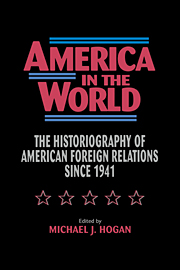Book contents
- Frontmatter
- Contents
- Preface
- The Authors
- Part One The State of the Art
- Part Two The Historiography of American Foreign Relations since 1941
- 6 The Historiography of American Foreign Relations: An Introduction
- 7 A Half-Century of Conflict: Interpretations of U.S. World War II Diplomacy
- 8 The Decision to Use the Bomb: A Historiographical Update
- 9 Origins of the Cold War in Europe and the Near East: Recent Historiography and the National Security Imperative
- 10 Making Known the Unknown War: Policy Analysis of the Korean Conflict since the Early 1980s
- 11 Eisenhower Revisionism: The Scholarly Debate
- 12 John F. Kennedy as World Leader: A Perspective on the Literature
- 13 The Unending Debate: Historians and the Vietnam War
- 14 Complaints, Self-Justifications, and Analysis: The Historiography of American Foreign Relations since 1969
- 15 An Emerging Synthesis? U.S.–Latin American Relations since the Second World War
- 16 Gideon's Band: America and the Middle East since 1945
- 17 The Cold War in Asia: The Elusive Synthesis
- 18 The Power of Money: The Historiography of American Economic Diplomacy
- 19 Coming in from the Cold War: The Historiography of American Intelligence, 1945–1990
- Index
6 - The Historiography of American Foreign Relations: An Introduction
Published online by Cambridge University Press: 05 June 2012
- Frontmatter
- Contents
- Preface
- The Authors
- Part One The State of the Art
- Part Two The Historiography of American Foreign Relations since 1941
- 6 The Historiography of American Foreign Relations: An Introduction
- 7 A Half-Century of Conflict: Interpretations of U.S. World War II Diplomacy
- 8 The Decision to Use the Bomb: A Historiographical Update
- 9 Origins of the Cold War in Europe and the Near East: Recent Historiography and the National Security Imperative
- 10 Making Known the Unknown War: Policy Analysis of the Korean Conflict since the Early 1980s
- 11 Eisenhower Revisionism: The Scholarly Debate
- 12 John F. Kennedy as World Leader: A Perspective on the Literature
- 13 The Unending Debate: Historians and the Vietnam War
- 14 Complaints, Self-Justifications, and Analysis: The Historiography of American Foreign Relations since 1969
- 15 An Emerging Synthesis? U.S.–Latin American Relations since the Second World War
- 16 Gideon's Band: America and the Middle East since 1945
- 17 The Cold War in Asia: The Elusive Synthesis
- 18 The Power of Money: The Historiography of American Economic Diplomacy
- 19 Coming in from the Cold War: The Historiography of American Intelligence, 1945–1990
- Index
Summary
The essays in this section survey some of the literature on the history of American foreign relations published, for the most part, over the last fifteen years. Although publication constraints sometimes made it difficult for authors to take account of the most recent books and articles, their essays nevertheless present a handy snapshot of the field as it stands today. They tell us something about the influences, intellectual and otherwise, that operate on diplomatic historians, what questions they are asking, and what approaches tend to dominate. They give us an excellent indication of what diplomatic historians are doing best these days, and what is missing in the field. The following is my assessment of what these essays, taken as a whole, have to say about the state of diplomatic history.
These essays evaluate the literature on the period since 1941 – the period that increasingly preoccupies diplomatic historians. The overwhelming majority of articles published in Diplomatic History, the journal of record in the field, focus on the twentieth century, and most of them on the years after World War II. What is more, the latest indicators suggest that diplomatic historians are concentrating increasingly on the years since 1960 – the last thirty-five years of American history. What are the implications of this recent-mindedness? To begin with, it means that diplomatic historians are working in a historiographical vacuum. They are not able to draw insights from a rich body of historical literature in the same way that diplomatic historians working on the first decades of the nineteenth century can be guided by the literature on republicanism, or those working on the interwar period can borrow from the literature on associationalism.
- Type
- Chapter
- Information
- America in the WorldThe Historiography of US Foreign Relations since 1941, pp. 159 - 165Publisher: Cambridge University PressPrint publication year: 1996
- 1
- Cited by

